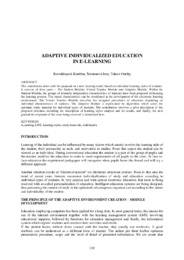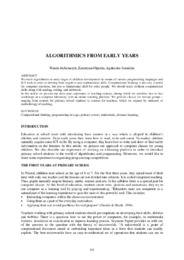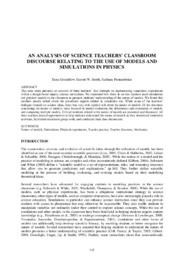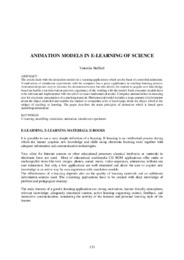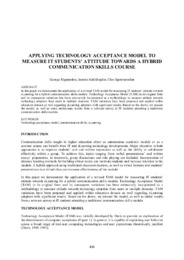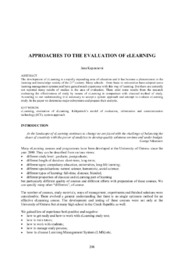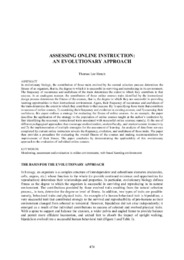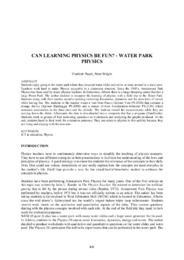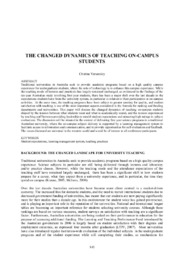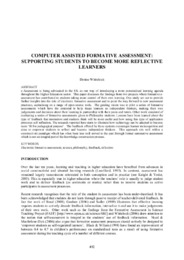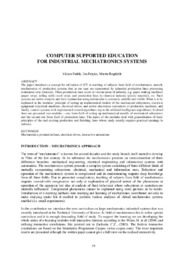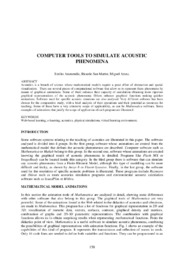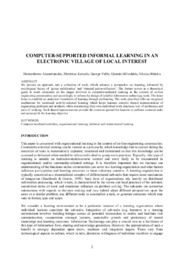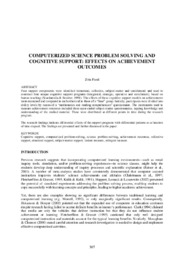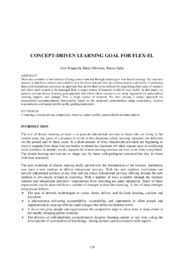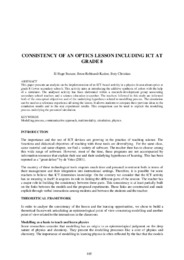Browsing ΕΝΔΟ - Ενδοπανεπιστημιακή ερευνητική παραγωγή Πανεπιστημίου Κύπρου by Author "Learning in Science Group, University of Cyprus"
Now showing items 1-20 of 142
-
Adaptive individualized education in e-learning
Kostolányová, Kateřina; Šarmanová, Jana; Takacz, Ondřej (University of Cyprus, 2010)This contribution deals with the proposal on a new learning model based on individual learning styles of students. It consists of three parts – The Student Module, Virtual Teacher Module and Adaptive Module. Within the ... -
Algorithmics from early years
Jochemczyk, Wanda; Olędzka, Katarzyna; Samulska, Agnieszka (University of Cyprus, 2010)We teach algorithmics at early stages of children development by means of various programming languages and ICT tools in order to develop their cognitive and mathematical skills. Computational thinking is not only a useful ... -
An analysis of awareness of students in the utilization of technology
Morgil, Inci; Yücel, A. Seda; Seçken, Nilgün; Oskay, Ozge Özyalçın (University of Zilina, 2005)With the rapid advancements in technology, people are being more tied with the technological tools and materials that meet the requirements of the society. The increase of knowledge with support from technology augments ... -
An analysis of science teachers’ classroom discourse relating to the use of models and simulations in physics
Gnesdilow, Dana; Smith, Garrett W.; Puntambekar, Sadhana (University of Cyprus, 2010)This case study provides an account of three teachers’ first attempts in implementing simulation experiments within a design-based inquiry science curriculum. We examined how three in-service teachers used simulations and ... -
Animation Models In E-Learning Of Science
Stoffová, Veronika (University of Zilina, 2005)The article deals with the simulation models in e-learning applications which are the basis of controlled animation. Visualization of simulation experiments with the computer has a great significance in teaching-learning ... -
Applying technology acceptance model to Measure it students’ attitude towards a hybrid Communication skills course
Rigopoulos, George; Keklikoglou, Ioannis; Sgouropoulou, Cleo (University of Cyprus, 2007)In this paper we demonstrate the application of a revised TAM model for measuring IT students’ attitude towards eLearning for a hybrid communication skills module. Technology Acceptance Model (TAM) in its original form and ... -
Approaches to the evaluation of elearning
Kapounová, Jana (University of Cyprus, 2007)The development of eLearning is a rapidly expanding area of education and it has become a phenomenon in the learning and knowledge society of the 21st century. Many schools – from basic to universities have adopted ... -
Assessing online instruction: an evolutionary approach
Lee Hench, Thomas (University of Cyprus, 2007)In evolutionary biology, the contribution of those traits evolved by the natural selection process determines the fitness of an organism, that is, the degree to which it is successful in surviving and reproducing in its ... -
Can learning physics be fun? - Water park Physics
Pasek, Vladimir; Wright, Peter (University of Cyprus, 2007)Students enjoy going to the water park where they descend water slides and swim or jump around in a wave pool. Teachers work hard to make Physics enjoyable in a classroom situation. Since the 1980’s, Amusement Park Physics ... -
Card game: attempts by primary level Education pupils to learn binary encoding
Kordaki, Maria; Mpimpas, Christos (University of Cyprus, 2007)This paper focuses on the learning of binary encoding by primary school pupils within a learning experiment mainly based on their being involved in playing a game. In fact, nineteen 6th Grade pupils participated in ... -
The changed dynamics of teaching on-campus Students
Varsavsky, Cristina (University of Cyprus, 2007)Traditional universities in Australia seek to provide academic programs based on a high quality campus experience for undergraduate students, where the role of technology is to enhance this campus experience. While the ... -
Computer assisted formative assessment: supporting students to become more reflective Learners
Whitelock, Denise (University of Cyprus, 2007)e-Assessment is being advocated in the UK as our way of introducing a more personalised learning agenda throughout the Higher Education sector. This paper discusses the findings from two projects where formative eassessment has ... -
Computer Supported Education For Industrial Mechatronics Systems
Fedák, Viliam; Fetyko, Ján; Repiščák, Martin (University of Zilina, 2005)The paper introduces a concept for utilisation of ICT in teaching of subjects from field of mechatronics, namely mechatronics of production systems that in our case are represented by industrial production lines processing ... -
Computer tools to simulate acoustic phenomena
Aramendia, Emilio; San Martin, Ricardo; Arana, Miguel (University of Zilina, 2005)Acoustics is a branch of science whose mathematical models require a great effort of abstraction and spatial visualization. There are several pieces of computational software that allow us to represent these phenomena by ... -
Computer-based antenna education at the Technological educational institute of crete
Vardiambasis, I. O.; Vardiambasis, K.; Melesanaki, T.; Papadimitriou, D.; Zaoutis, E.; Zacharopoulos, V.; Mavredakis, M. (University of Cyprus, 2007)In the past most electronic engineering students tended to have repulsion against subjects related to microwaves, electromagnetics and antennas, especially due to their abstract, theoretically demanding, and complex mathematics ... -
Computer-supported informal learning in an Electronic village of local interest
Akoumianakis, Demosthenes; Kotsalis, Dimitrios; Vellis, George; Miliodakis, Giannis; Bidakis, Nikolas (University of Cyprus, 2007)We present an approach and a collection of tools, which advance a perspective on learning, informed by sociological theory of ‘group stabilization’ and ‘situated action-reflection’. The former serves as a theoretical guide ... -
Computerized science problem solving and cognitive support: effects on achievement outcomes
Fund, Zvia (University of Zilina, 2005)Four support components were identified (structural, reflective, subject-matter and enrichment) and used to construct four unique cognitive support programs (integrated, strategic, operative and enrichment), based on human ... -
Concept-driven learning goal for flex-el
Pongpech, Alex; Orlowska, Maria; Sadiq, Shazia (University of Cyprus, 2007)There are a number of universities offering course material through elearning or web-based learning. The common practice is that these courses are available only for those learners who are seeking degree curriculum. ... -
Conceptual learning of selected physical topics through interactive multimedia
Kireš, Marián; Ješková, Zuzana; Degro, Ján; Haertel, Hermann (University of Zilina, 2005)In the contribution there is the importance of selected physical phenomena regarding to the physical thinking of students presented. The results of pedagogical research show limited understanding of selected physical ... -
Consistency of an optics lesson including ICT at grade 8
El Hage, Suzane; Becu-Robinault, Karine; Buty, Christian (University of Cyprus, 2010)This paper presents an analysis on the implementation of an ICT-based activity in a physics lesson about optics at grade 8 (lower secondary school). This activity aims at introducing the additive synthesis of colors with ...
